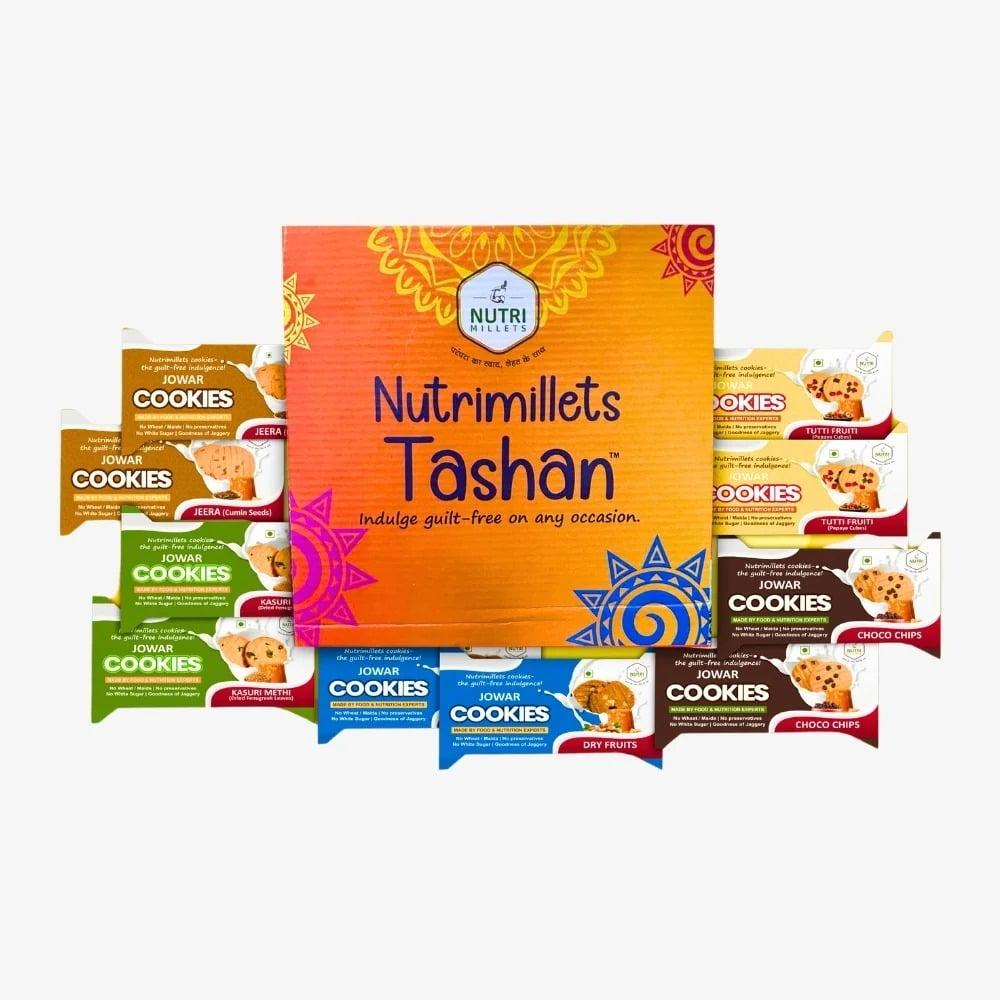Assorted Cookies Combo
₹450.0 / Grams
- Description
- Additional information
- Reviews (0)
- Q & A
- Sustainability Remark
- More Offers
- Store Policies
- Inquiries
Product Details –
Nutrimillets cookies – the guilt free indulgence with goodness of Jaggery and cow milk
No wheat / Maida – Gluten Free
No White Sugar
No preservatives
Available in 5 flavours
Taste and health together
Jowar Cookies- Dry Fruit Flavor – Made From – Jowar, Veg Fats, Jaggery, Milk and Dry Fruits
Jowar Cookies- Jeera (Cumin Seeds) Flavor – Made From – Jowar, Veg Fats, Jaggery, Milk and Jeera
Jowar Cookies- Tutti Frutti Flavor – Made From – Jowar, Veg Fats, Jaggery, Milk and Tutti Frutti
Jowar Cookies- Kasuri Methi Flavor – Made From – Jowar, Veg Fats, Jaggery, Milk and Kasuri Methi
Jowar Cookies- Choco Chips Flavor – Made From – Jowar, Veg Fats, Jaggery, Milk and Choco Chips
| Weight | 0.72 kg |
|---|
You must be logged in to post a review.
Q & A
1. Sustainability of Assorted Cookies Combo Product
a. Ingredients Sourcing:- Local Sourcing: If the ingredients used in the cookies are sourced locally, this reduces transportation emissions, which is a significant contributor to carbon footprints.
- Organic Ingredients: Using organic ingredients reduces the environmental impact by avoiding the use of synthetic fertilizers and pesticides, which can degrade soil and water quality.
- Eco-friendly Packaging: The use of biodegradable, recyclable, or minimal packaging helps reduce waste. Sustainable packaging materials like paper or compostable materials can lower the environmental impact.
- Bulk Packaging: Offering the combo in bulk packaging reduces the per-unit packaging waste, contributing to sustainability.
- Energy-Efficient Production: If the cookies are produced in energy-efficient facilities using renewable energy sources like solar or wind power, this contributes to a lower carbon footprint.
- Waste Management: Implementing waste reduction strategies, such as recycling byproducts or reusing waste materials in the production process, enhances sustainability.
- Fair Trade: If the ingredients are sourced from fair trade suppliers, this ensures ethical practices, supporting sustainable agriculture and fair wages for farmers.
2. Low Carbon Footprint of Assorted Chivda Combo
a. Ingredients:- Low-Impact Crops: The ingredients used in Chivda, such as flattened rice (poha), nuts, and spices, generally have a lower environmental impact compared to other food products. Crops like rice can have a lower carbon footprint, especially if grown using sustainable farming practices.
- Minimal Processing: Chivda ingredients usually undergo minimal processing, which consumes less energy and resources compared to heavily processed foods.
- Low Energy Cooking: Traditional methods of making Chivda, such as roasting or frying, can be energy-efficient if done in bulk and using efficient equipment. Modern production facilities may use optimized energy use processes, contributing to a lower carbon footprint.
- Batch Production: If the Chivda is produced in large batches, this reduces the per-unit energy consumption, thereby lowering the carbon footprint.
- Local Distribution: If the product is distributed locally, it reduces the transportation emissions, contributing to a lower carbon footprint.
- Lightweight Product: Chivda is a lightweight product, which means that more units can be transported in a single trip, reducing the overall carbon emissions per unit of product transported.
- Compact Packaging: Using compact, lightweight packaging for Chivda reduces the material used and minimizes waste, contributing to a lower carbon footprint.
Scientific Explanation
The carbon footprint of a food product is determined by several factors, including the type of ingredients, the energy used in production and transportation, and the packaging materials.- Agricultural Practices: Sustainable agricultural practices, such as crop rotation, reduced tillage, and organic farming, help sequester carbon in the soil and reduce greenhouse gas emissions. This is particularly relevant for the ingredients in both the Assorted Cookies Combo and the Assorted Chivda Combo.
- Energy Use: The carbon footprint is also influenced by the energy sources used in production. Renewable energy sources like solar or wind have a much lower carbon footprint compared to fossil fuels. Energy-efficient production processes further reduce the carbon footprint.
- Lifecycle Analysis (LCA): Conducting an LCA on these products would typically reveal that the largest contributors to carbon emissions are raw material extraction and processing, transportation, and end-of-life disposal. By optimizing each of these stages—such as using recycled materials for packaging, local sourcing of ingredients, and efficient logistics—both the Assorted Cookies and Chivda Combos can achieve a lower carbon footprint.
References & Supporting Studies
To substantiate the explanation, references to studies on sustainable agriculture, energy-efficient food production, and the environmental impact of packaging can be provided. Research articles that perform lifecycle assessments of similar products can also offer empirical evidence supporting the sustainability claims and carbon footprint reduction strategies. Unfortunately, without access to specific studies or sustainability reports for these products, this explanation relies on general principles and known best practices in sustainable food production.General Inquiries
There are no inquiries yet.

















Reviews
There are no reviews yet.